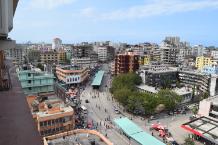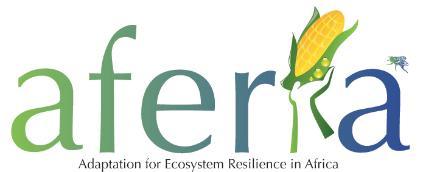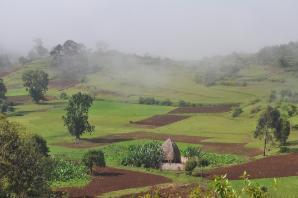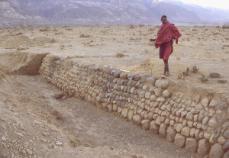Projects
Current Projects Past Projects
Current Projects
AFRI-CAN

Funding from the European Research Council’s (ERC) highly competitive Synergy Grant for the AFRI-CAN project will be conordinated from York, and working together with colleagues from the University of Witwatersrand Johannesburg, the Basque Centre for Climate Change and the Senckenberg Institute, the project will examine how mountain ecosystems and societies in East Africa respond to climate and environmental change.
Working across nine mountain regions, the AFRI-CAN project will analyse how communities interact with nature, how ecosystems evolve, and what pathways might support resilient and sustainable mountains.
Mountains globally are under pressure from a perfect storm of changing climates, growing populations, biodiversity threats and agricultural transformations; challenges that increasingly impact not just mountain communities, but also the surrounding lowlands that rely on highlands for the provision of resources, most obviously water. But such changes have global impacts too, since mountains are often hotspots of biodiversity and act as carbon sinks.

With the recognition that human systems and ecosystems are now so interlinked that they must be understood as social-ecological systems; in our case mountain socioecological systems (MtSES). Focussed on nine contrasting East African mountain settings, AFRI-CAN will combine state-of-the-art modelling and valuation assessments to co-produce pathways for sustainable futures. Three workpackages examine socioecological systems at three time scales: ‘The Past’ (6000 years ago to the present); ‘The Present’ (1970-2025); and ‘The Future’.
A forth focus will apply our new understanding of the drivers of change to other African and global MtSES through our strong connections with the Mountain Research Initiative and the Global Mountain Biodiversity partnership, co-producing scenarios and pathways of change with diverse stakeholders to inform how MtSES worldwide could navigate future opportunities and challenges.
Fishing for the Future (F4F):
Sustaining livelihoods through gender-sensitive climate risk assessments of brackish-water shellfisheries in the Gulf of Guinea.
Due to declining oyster populations accross the region this project aims to assure a sustainable livelihood of the many women dependent on this resource, by understanding how changing climate coupled with environmental pollution are likely to affect the current and future of the Oyster fisheries.

Peri-Urban Resilient Ecosystems (PURE)
Launched on 28th January 2020, involving NUST, UNAM, Namibian Housing Action Group, University of Cape Town, University of York, University of Winchester, ICLEI Africa, and the Stockholm Environment Institute York. Funded by UK Global Challenges Research Fund, the project aims to support climate resilient strategeies in Windhoek, South Africa. Mainstreaming Ecosystems (PDF ![]() , 1,377kb)
, 1,377kb)
Mountain Research Initiative
Rob Marchant is part of the Sciencific Leadership Council for the Mountain Research Initiative (MRI).MRI is a non-profit organization that promotes global change research in mountain regions across borders and disciplines through connection, communication, and collaboration – with a view to supporting pathways towards sustainable mountain development.
Tracing plastic pollution human food chain
Supported by the GCRF and working with the Universities of Exeter and Ghana we are researching how plastics breakdown in the environment, become part of the sediments as nano particles and then pass into the marine food-chain, ultimately bioaccumulating in fish for human consumption. The project is a pilot phase to initiate a long-term interdisciplinary collaboration with the Environmental Protection Agency of Ghana ad the Fisheries Minstry from Nigeria to develop more sustainable future fishereries and pathways for waste plastic management.
Environmetal and social impacts of illegal small scale mining in Ghana
Supported by the GCRF and led by Prof Henrice Altink at the University of York we are researching the social and environmental impacts of small scalle gold mining in Ghana. The team is comprised of historians, linguists social and environmental scientists from Ghana and York to understand the past, present and future interactions between people, the environment and mining. The project is a pilot phase supported by GCRF-QR funding to initiate a long-term interdisciplinary collaboration between the Universites of Ghana and York that aims to develop an evidence base for environmental, social and health interactions of un-regulated gold mining.
Refugia of Futures Past
Current research suggests that society may not meet Paris Agreement climate mitigation goals to keep global temperature rise below 1.5-2.0 oC, and global biodiversity losses are at accelerated rates similar to the ‘big five’ mass extinctions in the fossil record. The aim of this project is to initiate a long-term interdisciplinary collaboration to explore the baseline conditions for Earth habitability under long-term future global environmental change to influence adaptation research, policy, and practice.
https://www.whiterose.ac.uk/collaborationfunds/refugia-of-futures-past/
KITE partners: Rob Marchant.
Adaptation & Resilience to Climate Change (ARCC)

The Vetenskapsrådet (VR, Swedish Research Council) in association with Sida and Formas has funded a multiyear project titled ‘Adaptation & Resilience to Climate Change‘ that runs parallel and has overlapping focal areas to the REAL project (see below). The grant forms part of the VR/Sida/Formas Sustainability and resilience – Tackling climate and environmental change research programme. The project is lead by Paul Lane at Uppsala University and involves Anneli Ekblom (Uppsala University), Linus Munishi (Nelson Mendela African Institute of Science and Technology, Arusha), and Rob Marchant (York).
http://www.real-project.eu/sida-funded-adaptation-resilience-to-climate-change-project/
KITE partners: , Colin Courtney Mustaphi, Claudia Capitani, Rebecca Kariuki
Training for Development: East AFrican Growth Corridors and the China to Africa connection Development Corridors Partnership (DCP)

The concept of 'development corridors' is increasingly used to support economic growth in Africa, driven by international as well as national interests. Development corridors have tremendous development potential yet they face significant challenges. These include uneven development impacts, traversing so-called "underutilised" lands that are generally already populated and managed, and vulnerability to climate change. Such challenges result in a lack of appropriate research capacity in the region. This proposal aims to addresses these challenges through engagement with decision makers and by developing relevant capacity within research institutions and researchers in eastern Africa, China and the UK.
http://gtr.rcuk.ac.uk/projects?ref=ES%2FP011500%2F1
KITE partner: Rob Marchant
African Sky Forests (AFRI-Skyfor)

Working across all major equatorial mountains in Africa we are understanding the impacts of climate and land use change on mountain communties and how these different populations are adapting.
KITE Partners: Aida Cuni-Sanchez, Rob Marchant
A Human and Environmental History of the Atacama Desert: Understanding Ecological and archaeological interactions in arid areas of South America
Fuel availability can constrain human occupation of desert environments – fuel availability is as important as water, food and building materials. The aim of AHEAD is to reveal the use of fuelwood resources in negotiating human survival in three contrasting desert areas in South America over the long-term; from foraging subsistence societies to colonial mining exploitation.
KITE partners: Delphine Joly and
LandCover6k

![]()
LandCover6k addresses land-cover change across the globe that is climate-induced, natural, AND human-induced due to anthropogenic land use from ca. 1-2 millenia before the start of agriculture. It brings together paleoecologists, historians, archeologists, and modellers to explore and provide new information about anthropogenic land cover change. It aims to create products suitable for climate modellers and climate change policy makers.
KITE partners: , Colin Courtney Mustaphi, Oli Boles, Claudia Capitani, Suzi Richer
The Adaptation for Ecosystem Resilience in Africa (AFERIA)

The Adaptation for Ecosystem Resilience in Africa (AFERIA) is a two-year project to disseminate and communicate research results, insights and interactions of climate change and food security developed from a previous research and development project (CHIESA-Climate Change Impacts on Ecosystem Services and Food Security in Eastern Africa see below).
Lead partners are: Jimma University, Ethiopia; Pangani Basin Water Board (PBWB), Tanzania; Taita Environmental Research and Resource Arc (TERRA), Kenya; University of York, UK; University of Dar es Salaam, Tanzania; University of Helsinki, Finland
http://chiesa.icipe.org/index.php/aboutaferia
KITE partners: Rob Marchant, Philip Platts, Claudia Capitani
World Universities Network (WUN): Resilient Pasts and Sustainable Futures? Designing Socially Significant Scenarios

Sub-Saharan Africa, the poorest region globally and arguably the area with the highest dependence on agriculture and ecosystem services to sustain livelihoods, is characterized by economic growth, rising populations and upward development trajectories—all of which threaten sustainability pledges. Predictive scenarios can be used to define future environmental, social and economic development targets. However, for scenarios to be useful, socially significant and fit within existing governance at local, national and international levels, they need to develop. The working group will develop a position/methods paper and form a critical mass of diverse expertise that will be well-placed to feed into existing projects and actively contribute to developing opportunities in this area.
Participating Universities: The University of Leeds, The University of Western Australia, The University of York
WUN+ Partners: University of Copenhagen, Denmark; Critical Ecosystem Partnership Fund; University of Dar es Salaam, Tanzania; ICIPE, Nairobi; The Met Office Hadley Centre, UK; Oxfam International; Stockholm Environment Institute, Sweden; Tanzanian Forest Conservation Group, Tanzania; UNEP World Conservation Monitoring Centre; World Wide Fund for Nature (WWF),Tanzania; World Wildlife Fund (WWF), USA; World Conservation Monitoring Centre.
KITE partner:
Eco regional assessment and mapping of cost effective adaption strategies to the impact of climate change among crop farmers in West Africa
Supported by BBSRC and working with Dr Anthony Onyakuru from the University of Lagos we have been looking at the economic costs of climate change on agricultural communities across Nigera. The project has particularly looking at the costs of adapation to increased climatic variability across the region
KITE partners: Anthony Onyekuru,
Northern Thailand Scenarios
Working with the University of Chaing Mai on a project led by Dr Richard Friend under support of the GCRF we are looking at the role large multinational organisations in driving land use change in northern Thailand, particulary the extension of maize farming and the creating of smoke.
KITE partner:
Previous Projects
Archaeology of Agricultural Resilience in Eastern Africa (AAREA)

AAREA was an ERC-funded interdisciplinary research project (PI Daryl Stump) examining the long-term sustainability of two east African agricultural systems (Engaruka in Tanzania and Konso in Ethiopia) through a combination of archaeological, geoarchaeological, archaeobotanical and modelling techniques. In doing so the project aimed to move beyond a focus on these sites to present a frank and realistic appraisal of the role archaeology can play in sustainability debates worldwide, and to actively engage with broader developmental and conservationist agendas by directly liaising with governmental and non-governmental agencies that explicitly or implicitly act upon perceptions of long-term resilience.
Download the Policy Brief produced as part of AAREA.
KITE partners: , Suzi Richer
Climate Change Impacts on Ecosystem Services and Food Security in Eastern Africa (CHIESA)

The Climate Change Impacts on Ecosystem Services and Food Security in Eastern Africa (CHIESA) was a four-year (2011 to 2015) research and development project aimed at increasing knowledge on the impacts of climate change on ecosystem services in the Eastern Afromontane Biodiversity Hotspot (EABH). CHIESA was funded by the Ministry for Foreign Affairs of Finland, and coordinated by the International Centre of Insect Physiology and Ecology (icipe) in Nairobi, Kenya.
Download Policy Briefs produced as part of CHIESA.
KITE partners: , , Philip Platts, Dereje Denu, Mathew Mpanda, Dickens Odeny, Peter Omeny
Resilient Eastern African Landscapes (REAL)

REAL was a Marie Curie Actions Innovative Training Network (ITN), funded by the European Commission. The aim of REAL was to provide a longer-term historical perspective on human-environment interactions to enable future long-term sustainable use of East Africa’s fragile environment and resources.
KITE partners: , , , Esther Githumbi
Geospatial assessment of land productivity and climate change in Nigeria
The Nigerian government has over the years tried to combat desertification and deforestation by encouraging various afforestation and reforestation interventions. Some of the which include: Arid zone afforestation, World Bank Forestry II, Tropical Forestry Action 2 Programme, Nigerian Environmental Management Project, VISION 2010 of the Green Agenda and the Great Green Wall of 2014. This project will assess the impact of these interventions on identified hotspots and also assess the change dynamics of land productivity and climate change. This project is sponsored by the Commonwealth Postdoctoral Fellowship Scheme.
KITE partners: Esther Makinde and
